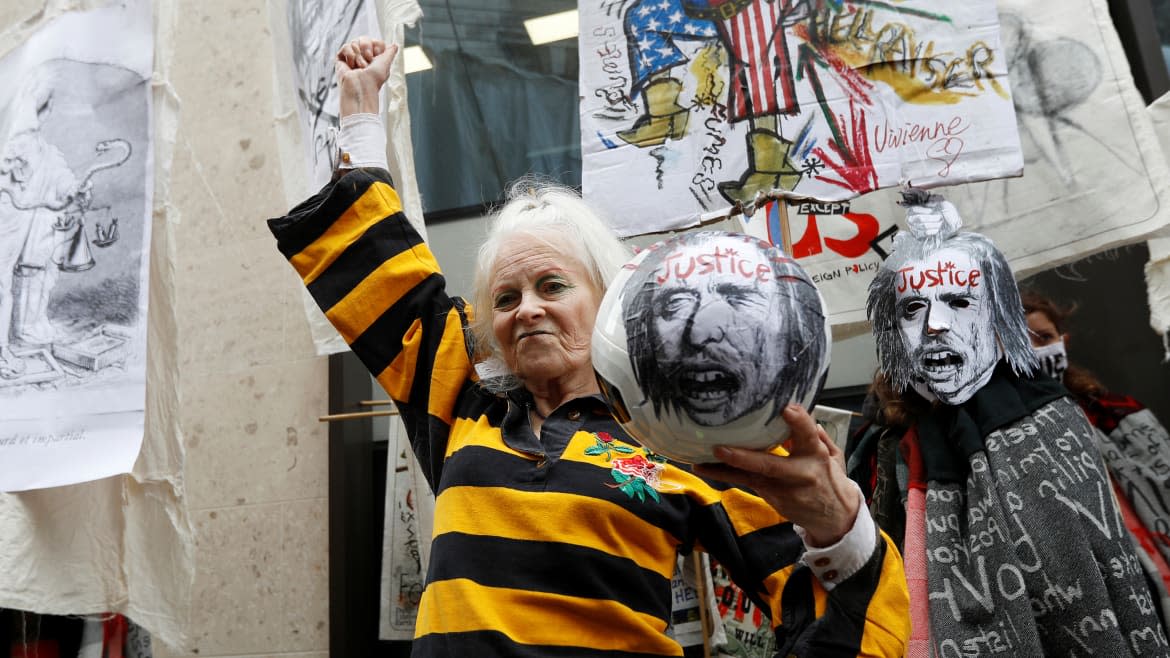Julian Assange’s Dad Says Son Faces ‘an Abuse Trial’ on Day One of Extradition Hearing

LONDON—The court hearing that could end in WikiLeaks founder Julian Assange being sent to the United States to face charges over the publication of hundreds of thousands of classified documents finally got underway Monday after a months-long pandemic delay.
Crowds crammed together outside the Old Bailey court building in central London where, inside, Assange told the district judge that he he does not consent to being extradited to the U.S. Over the next four weeks, the court will consider whether Assange can be forced to face justice in the U.S., where an 18-count indictment accuses him of recruiting hackers to steal top secret military information.
On Monday, Assange was re-arrested minutes before he appeared in the courtroom on the latest indictment that fleshed-out the existing charges against him. Asked whether he was willing to consent to be sent to the U.S., Assange offered the simple reply: “No.”
Trump Offered Assange Pardon if He Covered Up Russian Hack, WikiLeaks Founder’s Lawyer Claims
There were no opening statements by either the defense or the prosecution on Monday, but both sides released detailed documents laying out their legal claims shortly before the hearing began.
Assange’s lawyer argues that that his prosecution was “being pursued for ulterior political motives and not in good faith,” and accused the U.S. of misrepresenting facts “in order to bring this case within the bounds of an extradition crime.” They say the prosecution is seeking to “criminalize the application of ordinary journalistic methods to obtain and publish” information of public interest.
The lawyers representing the U.S. said the defence was wrongly “treating Assange as though he were engaged in reporting, in the same position of any journalist who comes into possession of classified information.” They also accused Assange’s lawyers of carrying out “an attack upon the president of the United States” in their defense, which repeatedly cites President Trump’s disdain for the press.
While there was little drama inside the courtroom on day one of the extradition hearing, it was much more lively outside. Extremely non-socially distanced crowds of people, including Assange’s father John Shipton and the fashion designer Dame Vivienne Westwood, gathered together to voice their support for the Wikileaks founder.
“I'm an activist, I am very frightened, I've lost days and years of sleep worrying about Julian Assange,” Westwood told reporters outside the London courtroom. She added: “Julian Assange is the trigger, he is shining the light on all the corruption in the world.”
Shipton has described his son’s extradition hearing as an “abuse trial,” arguing: “Julian is a publisher, the publication is WikiLeaks, [he’s] a journalist. It’s an oppression of journalism and free press everywhere in the western world. It can’t go on, it has to stop now.”
WikiLeaks' editor-in-chief Kristinn Hrafnsson told the crowd outside the court that “the future of journalism is at stake.”
U.S. Charges Assange With Helping Manning Crack Password to Steal Classified Documents
Across the city, Assange’s partner Stella Moris traveled to Downing Street in an attempt to deliver a Reporters Without Borders petition against the extradition, which has reportedly been signed by some 80,000 people. However, police refused to accept the document and deliver it to Prime Minister Boris Johnson’s residence.
Speaking 0n Sunday, Assange’s partner said: “Julian’s case has huge repercussions for freedom of expression and freedom of the press. This is an attack on journalism... If he is extradited to the U.S. for publishing inconvenient truths about the wars in Iraq and Afghanistan then it will set a precedent and any British journalist or publisher could also be extradited in the future.”
The hearing will last around four weeks and is expected to hear from academics who will give evidence on what they believe counts as journalism. The judge could then take months to consider her verdict, and the losing side is almost certain to appeal the decision.
If the courts do ultimately approve Assange’s extradition, the final decision will then rest with the British government. If convicted in the U.S., he faces a possible punishment of 175 years in prison.
Get our top stories in your inbox every day. Sign up now!
Daily Beast Membership: Beast Inside goes deeper on the stories that matter to you. Learn more.

